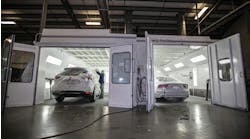Career Snapshot
When Kristin Newhall looks for industry acquisitions, she likes to look at things through an investment criteria lens.
"Because we focus in on little leaders in small companies, finding some sort of specialist or leadership niche in the market is critical," says Newhall, partner for The Riverside Company. "It's an industry where there are a lot of large players."
Newhall believes that the inherent nature of the automotive industry can lend itself to healthy returns.
Consumers will continue to need vehicles, along with maintenance and repair, one of many reasons investing in the aftermarket can yield such solid returns. The industry is also expansive and intricate, with endless combinations of niches and investment opportunities.
Another reason that the aftermarket remains successful is the industry's acceptance of new technology, which still has room for improvement but it notable nonetheless.
"The Internet is changing the automotive aftermarket. Although the segment is a laggard versus lots of other industries, it is changing and becoming more efficient, and how that impacts businesses throughout the distribution and procurement arena is going to be pretty dramatic," she says.
The broader OEM market does have a direct impact on the aftermarket, Newhall says.
"Obviously, the OEM business does help affect investments," she says. "I think understanding what's happening to the consumer broadly will help decide where you should be or where things are in the cycle. It is a very cyclical industry, and figuring out where you are is paramount."
To truly dissect the motives of the industry also entails separating the consumer side from the aftermarket at large.
"I think the auto aftermarket and consumer side has a different set of drivers," she says. "The correction there and the climbing out is obviously going to be a different cycle than the broader economic framework in terms of recovery. I think it's going to take a lot longer time for the consumer to come back."
This potential with the consumer segment was prominent when Riverside purchased JC Whitney, a specialist in direct marketing of auto parts and accessories, and a long-standing family business whose roots trace back almost 100 years.
"We looked at it as an investment opportunity, as a clear leader, a great brand name," Newhall adds. "If you look at the size of the automotive aftermarket, it is a large market with lots of opportunity to sell parts directly to the consumer. It's taken longer, the shift, than in other retail segments, but our thesis was we could continue to build on a great brand name and take advantage of consumer demands and the shift in consumer behavior."
She adds, "At Whitney, we looked at the shift to the Internet and how there's a rapid decrease in auto retailers. Consumers still need their products. You have an opportunity to capture that demand. There are shifts in that market that will be large, and with an ability to be flexible and nimble, you can find a spot and invest very wisely."



